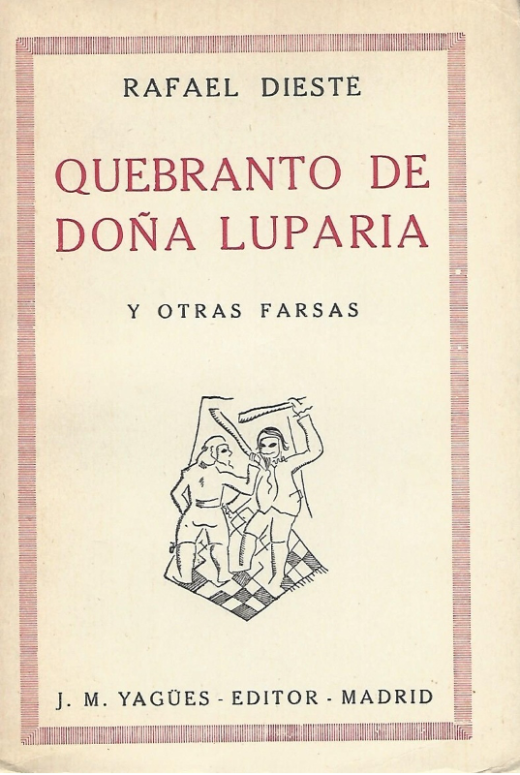
Printed
14 pages
Curiosa muerte burlada
The theme of Curiosa muerte burlada (The Strange Duped Death) is similar, in some of aspects, to El viejo y la niña (The Old Man and the Girl) from famous Spanish theatre reformer Leandro Fernández de Moratín (1760-1828). In this last play, the jealousy of an old husband makes him keep a close eye on the young woman he has married. The story told by Dieste is even closer to Cervantes’s (1547-1616) short story, entitled El curioso impertinente (The Curious Impertinent) and inserted in the first part of Don Quichotte (chapters XXXIII, XXXIV and XXXV). Some years before Dieste created this work, García Lorca had composed the play Amor de don Perlimplín con Belisa en su jardín (The Love of Don Perlimplín and Belisa in his Garden) which also featured the theme of the old man in love with a young girl and which ended in the same manner – the intertwining of the rites of love and of death.
The play was performed between 1934 and 1935 by the travelling theatre "Guiñol de Misiones Pedagógicas", founded by the Spanish Republic in order to provide access to cultural activities (theatre, cinema, art exhibition, music), to a didactic training and to libraries located in rural areas. After its first publication in 1934, the play was republished in 1981 in the edition of the complete works of Dieste without him modifying the text (while he had amended a number of his other texts published previously).
A jealous lover falls into his own trap
Esteban is the owner of a farm. He has a male servant, Silvestre, and a female servant, Oliva, who is also his mistress. Oliva really loves her master and she serves him so well that Esteban is thinking about marrying her. But he is wondering if Oliva really loves him or if she is after his belongings, so he explains to Silvestre the stratagem that he has planned to deploy in order to put her to the test: he will pretend that he has lost all of his possessions, and then fake his own death. Silvestre, in the presence of the supposed body, will have to feign love for Oliva in order to test her faithfulness. Esteban puts his plan into action. Thanks to the help of a fake doctor, Esteban pretends to die. Silvestre tells Oliva how he feels about her as planned, but his feelings are in fact true and he had always concealed them. Oliva faints, Silvestre carries her in his arms and the two of them run away from the house. Esteban sits up on his death bed and, taken aback by the revelation of truth, he actually dies of syncope.
First performance
Various performances in villages, by the Guiñol de Misiones Pedagógicas travelling theatre.
Publications and translations
Rafael Dieste, Quebranto de doña Luparia. Madrid: J. M. Yagües Editor, 1934, p. 111-147
Rafael Dieste, Teatro. Barcelone: Maia B., 1981.